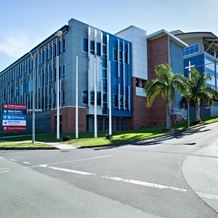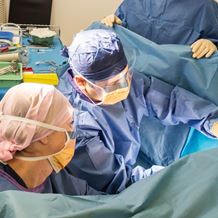Bowel Cancer Awareness Month: Cautionary tales from Susan and Wayne
St Vincent's Private Hospital Northside
Brisbane mother Susan Schmidt is a woman on two missions: a survival mission plus a mission to inform and educate everyone that they need to “stop the taboo and take notice of their poo” and not be complacent about early detection of possible symptoms of bowel cancer.

For much of 2023, Susan was feeling lethargic and very fatigued, but looked for reasons other than the most sinister of causes.
"Bouts of constipation? I just thought I’d consumed too much wine and cheese at social events over a number of days,” says Susan. “That feeling when I would take my daughter to early morning rowing training and I had to pull over and sleep in the car? That was just ‘busy life fatigue’, I told myself.
“At different stages I thought, and was told, the various symptoms might have been due to Covid, that I was perimenopausal, it was hormonal changes … with hindsight I should have listened to my body and been more vigilant and proactive about prioritising my health and really getting the right answers.”
While Susan was feeling generally unwell for several months, the low point came in September 2023 when she collapsed on the floor of the bathroom with severe stomach pain. She soon saw her GP, but because her horse had contracted salmonella poisoning they thought she might have it as well.
But three days later she experienced severe stomach pains again which prompted her GP to send her for a colonoscopy at St Vincent’s Private Hospital Northside. Within days she had the investigation completed, plus a full round of scans and consultation with St Vincent’s colorectal surgeon Professor Andrew Stevenson and she was diagnosed with stage 4 rectal cancer.
Given that there was spread of her cancer, Professor Stevenson referred Susan to St Vincent’s medical oncologist Dr Po Inglis who decided that treatment would be required to shrink the primary rectal cancer and the lung lesions with the treatment starting in September 2023.
Susan had a complete response to her primary rectal cancer, but within months her lung lesions started increasing in size and she was faced with having more systemic treatment.
There’s since been more surgery and more chemotherapy – but Susan is determined that other people, especially other women, can learn something from her difficult cancer journey.
“I should have known better with my standard of health literacy and the fact that I’ve worked as a physiotherapist for several decades. But I know first-hand, how easy it is to ignore symptoms or to downplay them," says Susan.
I never thought I was going to be diagnosed with stage 4 bowel cancer and lung lesions, but I have to say that all of my doctors and the ward staff at St Vincent’s Private Hospital have been amazing every step of the way especially in the oncology ward.
“While it’s been enormously challenging at so many points along the way, it has given me great confidence that I’m being given the best opportunity at winning the fight, with the care and clinical service at St Vincents.”
Susan has also joined with Bowel Cancer Australia as an ambassador to try and de-stigmatise one of the key proactive measures, supporting its Break the poo taboo campaign.
She also says it’s very important for people to have a good relationship with their GP who can often quickly pick up on any unusual symptoms or if something has changed for the patient.

As another St Vincent’s Northside patient Wayne Dale approaches the one year mark of his own shock Stage 4 bowel cancer diagnosis, he wistfully reflects on the most confronting year of his life and is also focussed on a dual purpose – he wants others to learn from his experience while singing the praises of St Vincent’s Private Hospital Northside as “being his saviour!”
Last July, Wayne went from being a healthy 55 year old male with no family history of bowel cancer and (what he thought was) minor symptoms of irregular bowel movements and a sore shoulder - to admitting himself to St Vincent’s Northside Emergency Department - to being diagnosed with advanced bowel cancer (more specifically locally advanced rectal and metastatic cancer of the liver) and suddenly being advised to get his affairs in order.
Within days of admission, Wayne was preparing for his first round of chemotherapy under the expert guidance of oncologist Dr Po Inglis and was grappling with the sudden and serious threat to his mortality.
Wayne - a data scientist with a national regulatory body, who’s a self-confessed ‘methodical and detail kind of guy’ - had previously received positive news in precautionary blood tests. But he and his GP were still concerned.

“We thought that I should be proactive and go to the St Vincent’s Northside emergency department and from the moment I arrived there, throughout the entire hospital, I was met with an outstanding level of professionalism, care, efficiency and compassion that has continued throughout my entire journey,” says Wayne.
“The Emergency Department’s responsive, no-wait approach ensured I was promptly attended to by a medical team who genuinely listened to my symptoms. I was given the shocking news of my Stage 4 cancer in under three hours. It was devastating, an incredibly difficult moment for my wife and I. I felt like I’d been hit by a freight train but I was quickly seen by specialists.
“Within a day or two, I had a path forward with a comprehensive care and treatment plan put in place. The seamless transition from diagnosis to treatment reassured me that I was in the best possible hands.”
A new study by the Cancer Alliance Queensland shows that while bowel cancer rates have been decreasing in the over-50 age group, there’s been an alarming increase in the incidence of young onset colorectal (bowel) cancer worldwide in people under the age of 50, with rates nearly doubling since the 1990s.
That was mirrored in more specific data with the study focussing on all colorectal cancer diagnoses in Queensland between 2001 and 2020 with the proportion of younger people (aged 20 to 49 years) increasing from 7 to 10% over 20 years and with a greater percentage of Stage 3 and Stage 4 cancer. The good news is that the younger group of patients had a better overall survival rate at various stages up to 10 years post-diagnosis.
Wayne continues to “count his blessings” that his cancer was detected when it was and says the nursing staff of Ward 1C at St Vincent’s Northside were amazing.
“From the moment I was admitted, their professionalism, expertise, and compassion were second to none. No concern was too small, and their guidance and support during those first eight days were invaluable,” says Wayne.
“The cancer care nurses were incredible as well. From my first day of admission, they provided clear and comprehensive information, which helped my wife and I to navigate the overwhelming amount of details regarding my diagnosis and treatment. We are truly grateful for their kindness and support.”
But good news has recently visited Wayne. While he has endured 20 rounds of systemic treatment involving chemotherapy a recent PET scan showing the bowel tumour is now ‘undetectable’ with continuing treatment now focussing on the tumours that have metastised in his liver.

“The treatment is working, and Dr Inglis has been amazing. I’m feeling hopeful, stronger, and more determined than ever. Onward and upward,” says Wayne.
Medical oncologist Dr Po Inglis, who is treating both Susan and Wayne, says both were (separately) diagnosed with locally advanced colorectal cancer with metastatic spread.
Dr Inglis says bowel cancer screening, most notably the fecal occult blood test (FOBT) is still the most effective protection measure that people can undertake.
“But a colonoscopy at 40 years of age - even if there’s no significant family history - is worth the investment if people want to be strongly proactive. Screening for those at high risk can start as early as 20 years old especially for those with certain germline mutations and familial predisposition syndromes,“ says Dr Inglis.
“It is a critical tool in the early detection and prevention of colorectal cancer, one of the leading causes of cancer-related deaths worldwide. A screening colonoscopy allows for the identification of pre-cancerous polyps or early-stage tumours, often before symptoms arise, significantly improving treatment outcomes and survival rates.
“Early detection not only increases the likelihood of curative treatment but also reduces the need for more aggressive therapies, minimising patient and family stress, and patient morbidity.”
- Home
- Patient News
- Bowel Cancer Awareness Month: Cautionary tales from Susan and Wayne




